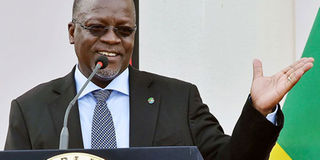GUEST COLUMNIST: So, is President Magufuli a populist?

President Magufuli
What you need to know:
In many ways, Magufuli is the same person in terms of political character as he was a minister; the only difference is that his character has been amplified by state power.
A few days ago, I was engaged in an emailed conversation with a friend who has long kept a keen interest in all things political in this country. He said that since coming to power, President John Magufuli has been characterised by some academics as a populist.
To him, and I will quote what was written verbatim, “Populist discourse, or rhetoric, is normally conceived of as one which constructs a people, an elite and pits the former in conflict with the latter, and presents the populist politician as a scourge of the elite, on behalf of the people. An elite, in this sort of discourse, is a ruling class or establishment, imbued with power.
Crucially, for a politician to use these terms, doesn’t mean that he believes in them, or is in ‘reality’ acting in the way described - it’s about the things he says and the image he communicates”.
He wanted to know what I make of all that and whether it is a fair characterisation of what President Magufuli says and performs. In particular, whether I think that he presents the (domestic) enemies that he confronts as an elite.
Responding to his question, I argued that the question of President Magufuli and populism is a complex one but categorically I do not by the argument that he is a populist politician. He has taken some decisions or said some things a populist would never do or say, for example the recently controversial cashew nuts export levy which caused an uproar in some parts of the country and within his own party.
President Magufuli is many things but he has never been driven by populism, in fact he loathes politicians he considers aim for what he has said is “cheap populism”, including some in his own party who took an opposing stance regarding the government’s position on the cashew nuts export levy. There are many other examples in the past. In many ways, Magufuli is the same person in terms of political character as he was a minister; the only difference is that his character has been amplified by state power.
While some of the things he has repeatedly said of or done might be considered by some “classic” populism like telling audiences that the poor had suffered for a long time, and that it is time for the rich suffered too; these have been said in light of certain events. Also, one has to understand our recent past to appreciate and have a proper context to some of these things: economic liberalization was characterized by daylight plundering of the country’s natural resources, those on the political and economic left were so critical of the government.
Given such a background, it is impossible to deal with mega corruption without going after some powerful individuals and their vested interests.
That said, he has not reformed anti-corruption laws or institutions. There are strict laws especially dealing with online content and if opinion polls are anything to go by in the post-Brexit and post-Trump world, his popularity dropped by wide margins (I personally do not put too much weight on such polls in this country), then what could possibly explain such a huge drop in popularity to a “populist” president?
At heart, Magufuli sees himself as someone who has a mission to correct the wrongs of the past. He rules/governs like a disciplinarian. Much of everything is black and white with no room for grey areas.
The presidency in this country has seen very different individuals and characters reside at Magogoni. Most of these did not change their political characters while in office.
The current Magogoni resident is in no way near the ease with which former PresidentKikwete ruled. To him, his domestic enemies are never presented as elites per se, it is anyone who does not share his vision of the future of this country regardless of one’s socio-economic class or political disposition.
He has filled some key government posts with serving and retired military officers, because he sees them as being well-disciplined compared with civilians.
What drives President Magufuli to do or act the way he does are his own convictions and not political populism. Classifying him as such, is misrepresenting and simplifying a complex political character.




